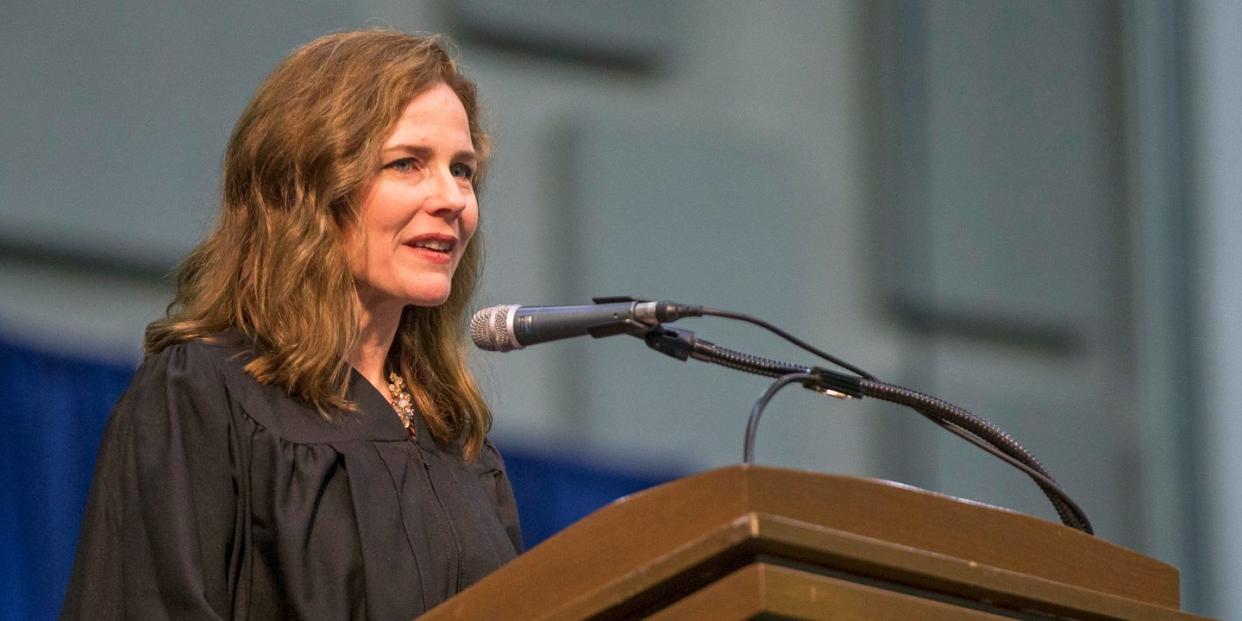What to Know About Amy Coney Barrett, Trump's Potential Supreme Court Nominee

Supreme Court Justice Ruth Bader Ginsburg passed away on Friday evening following a historic career, spurring the nation into a period of collective grief. While the attention, of course, should be on Ginsburg's unprecedented legacy, her absence also prompts an important question: Who will replace her? Ginsburg was one of only four liberal judges on the highest court, and President Trump and Senate Majority Leader Mitch McConnell have made it clear they are interested in filling her seat with a conservative judge before the presidential election in November. It's a surprising (and vaguely hypocritical) move given what happened in 2016 with President Barack Obama and Merrick Garland, but what's top of mind for many is who this new person could be.
It's been reported that Trump is planning to put forth a woman as his nominee this week, and at the moment, Amy Coney Barrett, a judge on the U.S. Court of Appeals for the Seventh Circuit, is at the top of the list. Here's what you need to know about her.
Who is Amy Coney Barrett?
Barrett is a 48-year-old former law professor who lives in South Bend, Indiana. If she were to be confirmed to the court, she would be the youngest justice on the bench, according to the New York Times. She would also be the justice with the least experience in the courtroom. Barrett is reported to be conservative and Catholic. A 2013 article from Notre Dame Magazine states that Barrett believes "life begins at conception."
In her career, Barrett has clerked for Justice Antonin Scalia and was a faculty member at Notre Dame Law School, her alma mater. The Times reports she earned "praise from colleagues as an astute scholar and jurist even if they did not always agree on her jurisprudential premises."
Trump reportedly considered Barrett for the Supreme Court when he was deciding who to nominate to replace Supreme Court Justice Anthony Kennedy. But according to Axios, Trump had said, "I'm saving her for Ginsburg." The president famously nominated Brett Kavanaugh instead.
Barrett is married to Jesse Barrett, an attorney, and she has seven children, two of them adopted.
What have people said about her?
According to the Times, Barrett's peers have described her as a "texualist," meaning "one who interprets the law based on its plain words, as opposed to someone who looks to accomplish the legislature’s purpose." They also called her an "originalist," or "a judge who interprets the Constitution according to the understanding of those who drafted and ratified it."
Nan Aron, the president of the liberal group Alliance for Justice, told the Times: "Amy Coney Barrett meets Donald Trump’s two main litmus tests: She has made clear she would invalidate the A.C.A. and take health care away from millions of people and undermine a woman’s reproductive freedom." (The Supreme Court will hear a challenge to the Affordable Care Act this November.)
Barrett's colleague, Notre Dame law professor Paolo G Carozza, told The Guardian: "Some of the senators raised the question of whether her religious convictions might affect the way she interprets the law. I just found it, to be honest, kind of laughable. Knowing her as well as I do and having seen the way she operates, the only way in which her religious convictions are going to affect what she does as a judge is that they give her the humility to say, 'What I do is all about the law and all about interpreting the law and the basic values of upholding the rule of law and the legal system and nothing else.'"
Where does she stand on abortion rights?
Trump's desire to fill the court with conservative judges has left many wondering about the future of abortion and whether the Supreme Court could or would overturn Roe v. Wade, the 1973 decision that affirmed the constitutional right to abortion.
When it comes to Barrett's record on abortion, the Times reported that in 2016 Barrett said "the core holding" of Roe v. Wade, i.e. the right to have an abortion, was not likely to change, though she said that state-specific restrictions might. Then during her confirmation hearing in 2017 to become an appeals court judge, she said she would follow Supreme Court precedent when it comes to abortion.
She has held to precedent in recent years, upholding a law in Chicago that protected people entering abortion clinics from protesters; an almost identical law was upheld in the Supreme Court in 2000. However, the opinion from the Seventh Circuit, which she joined, "was skeptical of the constitutionality of the Chicago law under the First Amendment."
Politico reports that in 2013, she wrote in a Texas Law Review article that she agrees "with those who say that a justice’s duty is to the Constitution and that it is thus more legitimate for her to enforce her best understanding of the Constitution rather than a precedent she thinks clearly in conflict with it."
The Washington Post also recently ran an op-ed, exploring how, in Barrett's short time serving on the bench, she has ruled against abortion rights in two abortion cases, including joining a dissent that stated "none of the Court’s abortion decisions holds that states are powerless to prevent abortions designed to choose the sex, race, and other attributes of children."
This post will continue to be updated.
You Might Also Like

